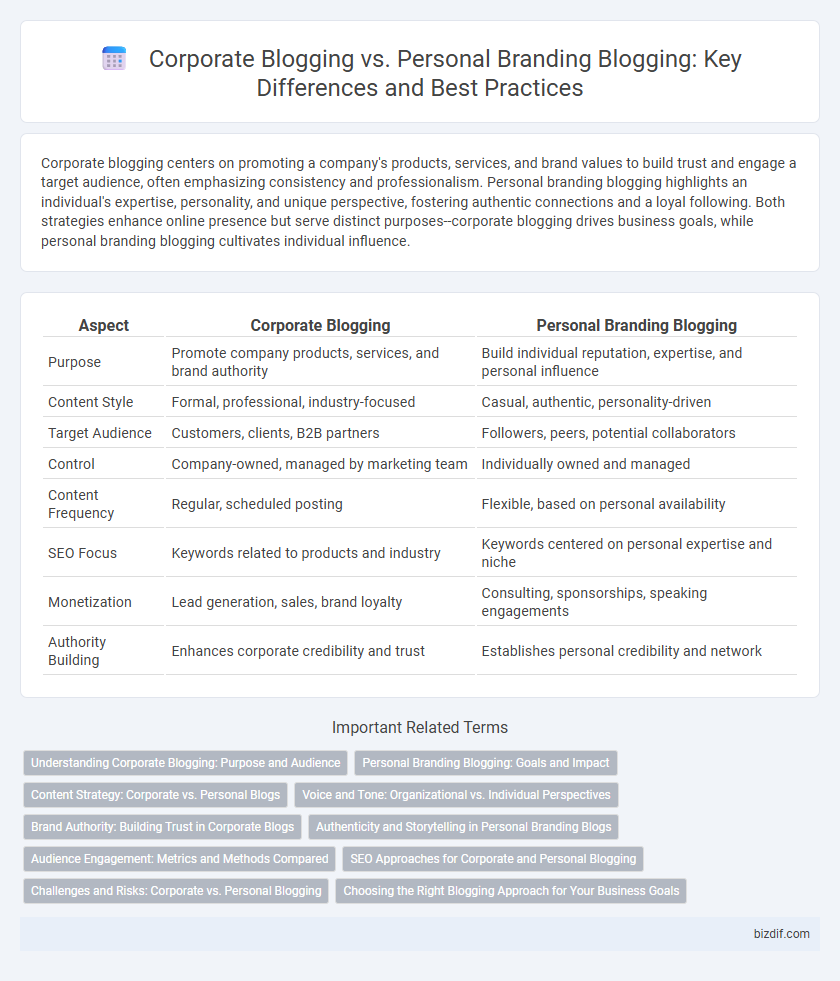Corporate blogging centers on promoting a company's products, services, and brand values to build trust and engage a target audience, often emphasizing consistency and professionalism. Personal branding blogging highlights an individual's expertise, personality, and unique perspective, fostering authentic connections and a loyal following. Both strategies enhance online presence but serve distinct purposes--corporate blogging drives business goals, while personal branding blogging cultivates individual influence.
Table of Comparison
| Aspect | Corporate Blogging | Personal Branding Blogging |
|---|---|---|
| Purpose | Promote company products, services, and brand authority | Build individual reputation, expertise, and personal influence |
| Content Style | Formal, professional, industry-focused | Casual, authentic, personality-driven |
| Target Audience | Customers, clients, B2B partners | Followers, peers, potential collaborators |
| Control | Company-owned, managed by marketing team | Individually owned and managed |
| Content Frequency | Regular, scheduled posting | Flexible, based on personal availability |
| SEO Focus | Keywords related to products and industry | Keywords centered on personal expertise and niche |
| Monetization | Lead generation, sales, brand loyalty | Consulting, sponsorships, speaking engagements |
| Authority Building | Enhances corporate credibility and trust | Establishes personal credibility and network |
Understanding Corporate Blogging: Purpose and Audience
Corporate blogging serves as a strategic tool for businesses to enhance brand authority, engage target customers, and drive lead generation by sharing industry insights, company updates, and product information. The primary audience includes potential clients, existing customers, industry peers, and stakeholders seeking credible and value-driven content. Effective corporate blogs align content with business goals, focusing on trust-building and showcasing expertise within a specific market niche.
Personal Branding Blogging: Goals and Impact
Personal branding blogging centers on establishing an individual's expertise and unique voice to build credibility and influence within a niche. Its primary goals include fostering trust, growing a dedicated audience, and enhancing career opportunities or business partnerships through authentic storytelling and valuable content. This approach generates a deeper emotional connection, leading to higher engagement and long-term loyalty compared to corporate blogging.
Content Strategy: Corporate vs. Personal Blogs
Corporate blogging prioritizes consistent brand messaging and targeted industry insights to support broader marketing goals, often featuring product updates, case studies, and professional expertise aimed at enhancing company authority. Personal branding blogs emphasize authentic storytelling and niche expertise to build a relatable persona, fostering engagement through personal experiences and thought leadership. Content strategies diverge as corporate blogs rely on data-driven, scalable content aligned with business objectives, while personal blogs focus on unique, voice-driven narratives that cultivate community trust.
Voice and Tone: Organizational vs. Individual Perspectives
Corporate blogging employs a consistent, professional voice reflecting the company's values and brand identity, aiming to build trust and authority within the industry. Personal branding blogging uses a conversational, authentic tone that highlights the individual's personality, experiences, and expertise to foster a personal connection with the audience. Balancing organizational perspectives with individual storytelling creates diverse content that resonates across target demographics.
Brand Authority: Building Trust in Corporate Blogs
Corporate blogging strategically enhances brand authority by consistently delivering expert content that builds trust among target audiences. Unlike personal branding blogs that highlight individual expertise, corporate blogs leverage the company's reputation and resources to establish credibility and industry leadership. This trust fosters customer loyalty and distinguishes the corporate brand in competitive markets.
Authenticity and Storytelling in Personal Branding Blogs
Authenticity in personal branding blogs drives deeper audience engagement by sharing genuine stories and personal experiences that resonate emotionally. Storytelling techniques create a relatable narrative, differentiating personal brands from corporate blogs that often prioritize polished, generalized content. This approach fosters trust and loyalty, essential elements for building a strong, memorable personal brand.
Audience Engagement: Metrics and Methods Compared
Corporate blogging typically measures audience engagement through metrics like page views, click-through rates, and lead generation, emphasizing content that aligns with brand messaging and drives conversions. Personal branding blogging prioritizes direct interaction, including comments, social media shares, and follower growth, reflecting authentic connection and community building. Analyzing bounce rates and session duration can reveal differences in reader retention between corporate authority and personal influence-driven content.
SEO Approaches for Corporate and Personal Blogging
Corporate blogging emphasizes targeted keyword strategies and high-quality backlinks to boost domain authority and enhance search engine rankings for businesses. Personal branding blogging leverages niche-specific long-tail keywords and authentic storytelling to build trust and engage a loyal audience, improving organic visibility. Both approaches require consistent content updates, SEO-friendly meta tags, and mobile optimization to maximize search performance.
Challenges and Risks: Corporate vs. Personal Blogging
Corporate blogging faces challenges such as maintaining brand consistency, managing multiple stakeholders, and avoiding legal risks related to company disclosures. Personal branding blogging encounters risks including reputation vulnerability, privacy concerns, and difficulty separating personal opinions from professional image. Both require strategic content management to balance authenticity with audience expectations while mitigating potential backlash.
Choosing the Right Blogging Approach for Your Business Goals
Corporate blogging emphasizes consistent brand messaging, industry expertise, and lead generation to support business growth, while personal branding blogging prioritizes authentic storytelling and establishing thought leadership to build trust and unique identity. Choosing the right blogging approach depends on your business goals: corporate blogging suits organizations aiming to scale, enhance SEO, and nurture customer relationships, whereas personal branding blogging aligns with entrepreneurs or professionals seeking to connect personally with their audience and showcase expertise. Evaluating target audience, content tone, and long-term objectives ensures the chosen strategy maximizes impact and ROI.
Corporate Blogging vs Personal Branding Blogging Infographic

 bizdif.com
bizdif.com